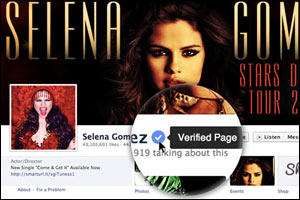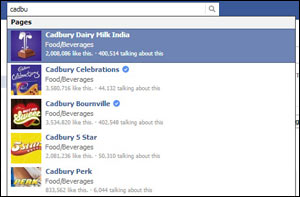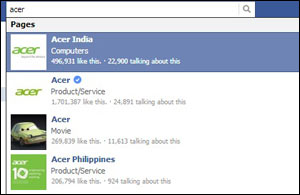All brands need to know about Facebook Verified Pages!
Facebook has recently launched ‘verified pages’ feature to help people check authentic accounts of personalities and businesses. afaqs! examines how it can help brands.
Facebook has recently launched ‘verified pages’ feature to help people find out authentic accounts of celebrities, high-profile people and businesses on the platform. According to the company, verified pages will have a small, blue check mark beside the profile name on timelines, in search results and elsewhere on Facebook (as seen in the profiles of Salman Khan, MS Dhoni and Samsung India).
 Some well known public figures and pages with large followings (including celebrities, journalists, government officials, popular brands and businesses) will be verified by Facebook as having an authentic identity. “We verify profiles or pages to help you be sure that they are who they claim to be. Not all authentic profiles and pages are verified and one can’t request to have a profile or page verified. You can report fake accounts that are impersonating you, your business or your brand,” Facebook says in a blog post (http://newsroom.fb.com/News/619/Verified-Pages-and-Profiles).
Some well known public figures and pages with large followings (including celebrities, journalists, government officials, popular brands and businesses) will be verified by Facebook as having an authentic identity. “We verify profiles or pages to help you be sure that they are who they claim to be. Not all authentic profiles and pages are verified and one can’t request to have a profile or page verified. You can report fake accounts that are impersonating you, your business or your brand,” Facebook says in a blog post (http://newsroom.fb.com/News/619/Verified-Pages-and-Profiles).
Interestingly, Facebook adds that it will proactively reach out to verify accounts but there is no mechanism to request verification. Instead, Facebook recommends that celebrities, public figures and brands and businesses, who believe that they are being impersonated, should report a fake account.
To verify accounts, Facebook says businesses and celebrities need to submit a government-issued photo ID, which Facebook promises to delete immediately after verification. For now, Facebook is taking charge of this task by itself and there is no action required to be taken by page/profile/business owners.
Facebook’s verified accounts feature follows a similar service from Twitter, which created verified accounts in 2009. Google+ introduced verified accounts quite early in its own social networking history, back in 2011.
Do consumers really care?
Unlike other social networks, Facebook has a huge number of pages and profiles which are duplicate or try to mimic original brands, businesses and public figures. In the social media world, posts can go viral pretty quickly, which is why it is important to distinguish the authentic from the fake.
However, considering that consumers engage with the content being offered through the pages, rather than the authenticity of the brand page, will they now be bothered to follow only a verified page and unfollow the others?
“Consumers engage with brands on their news feed and rarely do they engage on the fan page as conversations with a brand happen on the user’s feed. So, brands being verified or not will not matter to consumers as 80 per cent of interactions are happening on consumers’ feed,” opines Rajiv Dingra, founder and CEO, WatConsult.
Like celeb pages in India, brands too have a cult following, and there is a lot of duplicity and multiplicity as, for many brands, besides an official page, there will be several community pages related to the brand and its products. However, Facebook allows brands to merge their duplicate communities and that takes care of any duplicate identity for brands created by other fans. For example, Coke’s global page was actually started by fans themselves and instead of shutting it down, Coca-Cola allowed the fans to take control.
“Brands and celebrities both tend to gain from this feature as it addresses the issue of duplicity. Besides, consumers will gradually begin caring about following a verified page as they would like to get authentic information from a verified source, rather than reading a rumour. Moreover, in case someone has a complaint about a product, he or she has to file it with the verified page so as to get an assured reply addressing the issue,” states Nimesh Shah, head maven, Windchimes Communications.
One too many pages to verify?
Facebook announced this feature last week and till now, quite a few brand pages in India have been verified. But for many brands operating country-specific pages and pages for their sub-brands, the story is somewhat different.
For instance, a search for ‘Cadbury’ reveals five pages that include pages from its sub-brands. But out of these five, only two have been verified till now. The same goes with Acer, where ‘Acer India’ is not a verified page, whereas Acer (Global) has a verified tag. Likewise, Maruti Suzuki doesn’t have a verified fan page for any of its cars, yet.
“If all five pages have the brand name with some suffix and in a search, if all five appear together and three of them appear as verified, then yes, there could be a deterrence against going to the other two, as it would appear that those two are not genuine. On the other hand, if the five pages have completely different names (even if they belong to the same mother brand), the two that are not verified may not have much of a problem,” states Sanjay Mehta, joint CEO, Social Wavelength.
Facebook is understandably rolling out the feature gradually and in future, there could be a verified tag in the above mentioned brand pages as well. Till such time, will the absence of the ‘blue tick mark’ cause the page to face the risk of losing new followers?
“The indicators of verification are not just the ‘tick mark’ sign on Facebook, but features like the brand code, consistent messaging, cover photo, design, and engagement activities. The verified ‘tick mark’ sign is simply a cherry on top of the brand’s digital existence,” informs Harshil Karia, co-founder and online strategist, FoxyMoron.
For a brand, the consumers will join the verified page. For a celebrity, however, the consumers will join the verified as well as the non-verified page. Content on both the pages will differ since verified pages might have more personal and exclusive content as opposed to generic content posted by user-generated pages merely to fuel popularity. The official pages will keep the consumer updated with all the latest updates and information. So, a true fan will join both the pages, whereas select others will opt for only the verified pages.
It’s a celeb world?
At the outset, verified pages seems to be a feature which is more helpful in identifying authentic celebrities rather than brands. It will end up helping celebs more than brands as brands already have a significant following on Facebook and their fans already know the official page.
“It will definitely be more helpful for celebrities and their pages as they have a more strong ‘cult’ following. Fans keep an eye out for real-time updates daily, on their favourite celebrities. The same cannot be said for a brand that most often advertises heavily across digital platforms to create buzz and establish large-scale presence,” states Karia.
As the feature rolls out completely, brands will also need to get their act together and have their brand pages verified by Facebook in the better interest of their fan base. “Consumers won’t like to waste their ‘likes’ for non-verified pages. Moreover, as the consumers get educated about the feature, they would look for a verified tag in brand pages when they want to be a part of any contest run by that brand. Also, this can become a good PR tool for the brands as media messages can be carried out and flashed in those accounts,” opines Shah.
All said and done, the feature will help those brands that are prone to consumer-generated reproductions of their pages. Brands can make use of this new feature by segmenting themselves from pages created out of brand love and loyalty. Also, it will help the consumers to identify which page is the original asset, and which one is not. Mehta sums it up by saying that till the time this is an exclusive feature, verified brands will enjoy bragging rights, as being one of the exclusive few that have verified pages!
Courtesy: www.afaqs.com





